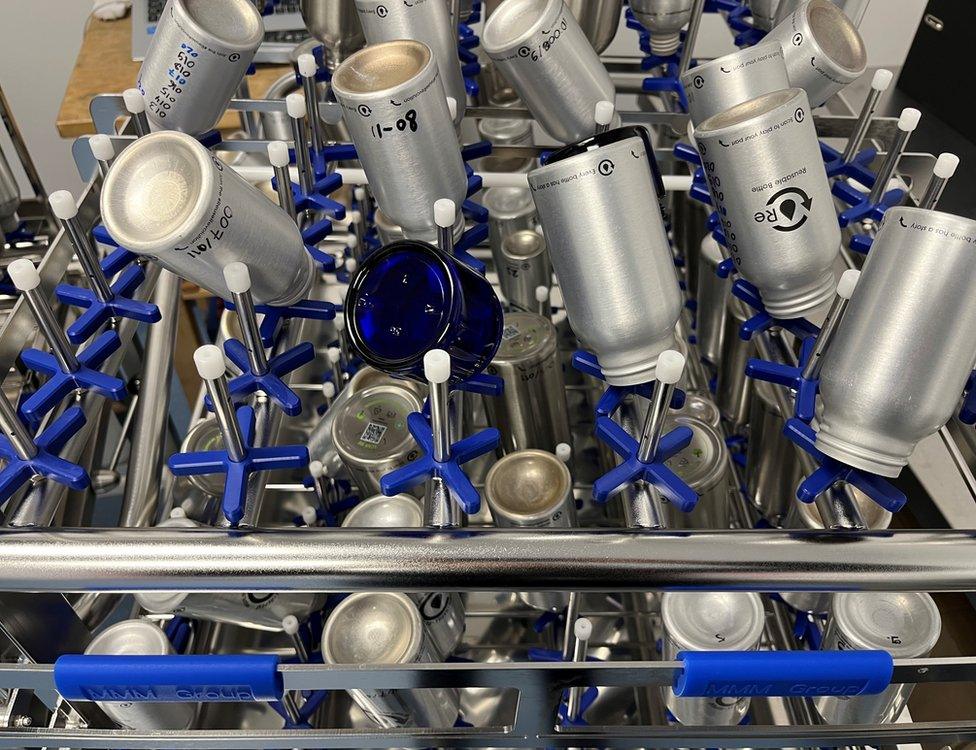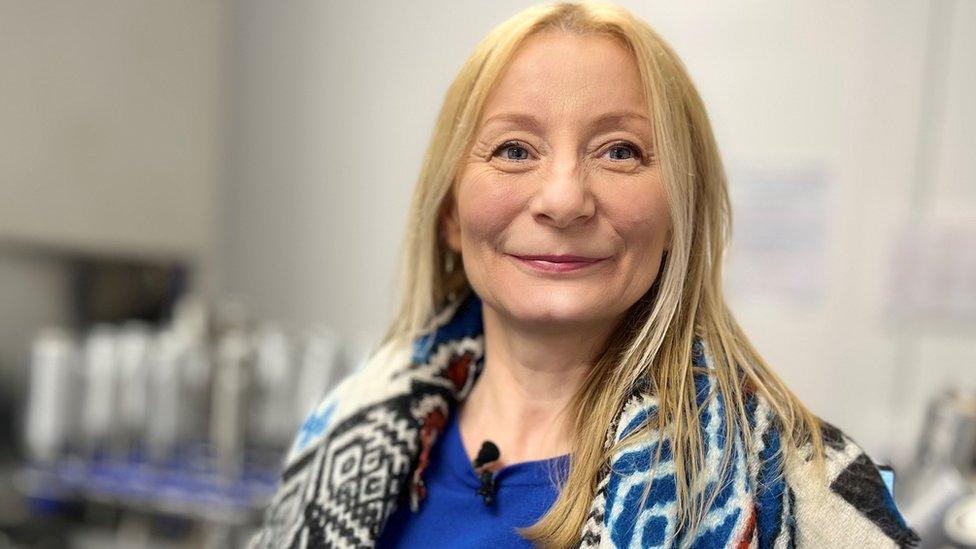How is the beauty industry going green?
- Published
- comments
Salon owner Jenn Linton says most hairdressing waste products can now be recycled - including hair
The beauty industry may not have been the most environmentally friendly in the past, but some Scottish firms are attempting to change that.
Jo Childley is co-founder of the Beauty Kitchen brand, as well as Re which works with other companies that want to explore using reusable packaging.
She wants to increase the reuse of packaging in an industry where 95% of containers are thrown out after one use.
At her Wishaw HQ she shows me empty beauty product containers which once held things like oils and moisturisers.
Customers can return their empties in a variety of ways from dropping off at a shop to sending back for free by post.
The containers are first given a pre-wash at a sink with upward water jets to remove any remaining product and then loaded on to spindles on racks, allowing lots of different kinds of container to fit.
"It's like a big fancy dishwasher," Ms Chidley says.
"The washing facility that we have here is medical grade so it means it's used in things like hospitals or laboratories, it's a higher level.
It uses water, heat and steam to be able to do things to the standard needed.

Beauty containers waiting to be washed
Ms Chidley studied chemistry at university.
A love of beauty and botany led to her experimenting with making her own products and co-founding Beauty Kitchen in 2014.
The company worked through the logistical challenges of getting their own reusable packaging up and running which in turn has led to them working with much bigger companies including Unilever.
Ms Chidley says they are harking back to a time when reusable packaging was the norm.
"What we've done is look to the past but we've made it contemporary," she says.
Ms Chidley says they use technology to know exactly what was in the bottle or jar.
"It means that when we get it back here for cleaning we know which cleaning protocol it needs to go through."

Jo Childley wants to cut down on packaging by increasing reuse
In Aberdeen, Jenn Linton, the owner of Linton and Mac hair salon, says they now recycle pretty much everything.
That includes colour tubes, salon towels and hair foils contaminated with colour.
In the past foils have been difficult to recycle because of the risk of chemicals ruining a whole batch of recycling. It is now separated and can be dealt with in the usual way.
But what usually gets most attention is the recycling of human hair. Once swept up to be binned now it is swept up and used.
Some customers even take their hair clippings away as a slug deterrent or compost for the garden.
This, along with the prominent recycling bins, means that sustainability comes up a lot in the chat at the mirror between stylist and customer.
"I've got a team of 30," Ms Linton says.
"If all those people can tell two to five people a day that we recycle and how easy it actually is, it really spreads the word and makes it less daunting for people."
The salon charges a "green fee" of £2 to cover costs.
Hair booms
Linton and Mac is teamed up with specialist recycling service, the Green Salon Collective, which works with the industry to prevent waste going to landfill or incineration.
It has at least 10 different ways hair can be used, external, including wigs, as an alternative to wool, for composting and for art.
Hair is also woven into mats which can be used to mop up small spills of oil on streets, gardens or workplaces.
It can also be made into hair booms where it is stuffed into a sausage-shaped barrier which can deal with larger spills.
In 2021 in Northern Ireland, the Green Salon Collective used a hair boom to protect the shoreline from oil. At the time they had collected about 400kgs of hair and they used about 30-45kg over the weekend of the clean-up.

A hair boom in use in a small oil leak in Northern Ireland
"Unfortunately the hairdressing industry has traditionally been quite a wasteful one," says Jess Rigg of Green Salon Collective.
She says most of that has been because there have not been - until now - solutions for the main waste streams like hair and metal foils contaminated by colour.
They work with other specialists which allow things to be recycled which once were not.
Since they started in 2020 they say they have noticed both customers and salons looking to be more sustainable and they now have about 1,000 member salons across the UK and Ireland - what they describe as a "great number".
They reckon they have doubled the amount of hair foils being recycled from 1% to 2%.
"We've still a long way to go," says Ms Rigg.